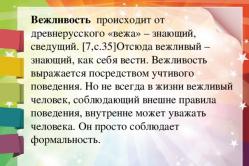Antipyretics for children are prescribed by a pediatrician. But there are emergency situations with fever when the child needs to be given medicine immediately. Then the parents take responsibility and use antipyretic drugs. What is allowed to be given to infants? How can you lower the temperature in older children? What medications are the safest?
https://accounts.google.com
Slide captions:
Be careful! He said about his granddaughter: What a shame - I gave her a briefcase, I see: she’s very happy! But you can’t be silent like a fish, Well, I would say -…. And what a word - very expensive!
Preview:
To use presentation previews, create a Google account and log in to it: https://accounts.google.com
Slide captions:
Magic words. The magic word - hello Compiled by: Karpova V.V. - primary school teacher
The goals of the class hour: to develop the desire of children to use words of polite address in their speech, to continue to teach children respect and polite communication with people around them, to develop imagination, attention, memory, the ability to analyze, and draw conclusions.
You need to know how twice two are all the magic words. These short words are heard everywhere in the morning. They live for centuries in the world. It's high time to remember them!
Greeting words: Hello; Good morning; Good afternoon; Good evening.
What is the meaning of a smile? A smile makes a gloomy day brighter, A smile makes a rainbow wake up in the sky... Share your smile, And it will come back to you more than once.
Thank you Please Sorry Goodbye Bon appetit Sorry Words of politeness:
Z – health, vigilance. D – kindness, goodwill, trust. R – joy, determination. A – accuracy, activity. B – fun, generosity. S – happiness, freedom. T – warmth, patience, creativity. B – loyalty, magic. U - respect, confidence, smiles. Y – sincerity, grace. T – talent, hard work. E – naturalness.
Be careful! I met my neighbor Vitya... It was a sad meeting: He came at me like a torpedo from around the corner! But - imagine - in vain I waited for the word from Vitya - ... . And what a word - very expensive!
Yulia Pigalkina
Project for senior preschool children “Magic words”
PROJECT
“MAGIC WORDS”
COMPLETED: children senior preschool age
Problem Analysis: when reading the story by V. Oseeva « Magic word» , Nikita asked: "Which words are called magic?»
Problem: which words are called magic?
To solve this problem it will be implemented project on the topic “Magic words”.
Type project: practice-oriented, mono project, internal, group, long-term.
Target: continue to form the foundations of a culture of speech etiquette
Tasks: Main tasks in the area "Communication":
1. continue to replenish vocabulary of polite words;
2. develop dialogic and monologue speech and its intonation
expressiveness
3. practice using polite words words
Integration with others regions:
Region : continue
develop the ability to listen carefully to literary
works, answer questions about what you read;
Region "Artistic creativity": reinforce a skill
coloring outline images of objects, skill
drawing familiar objects;
Region "Socialization": cultivate a culture of communication; skill
talk to each other politely, address each other politely
comrades; the ability to act correctly and politely in different situations
Internet resources - resources, "Comprehensive classes"//Ed. N. E. Veraksy, T. S. Komarova, M. A. Vasilyeva, Demidova O. N. “Be polite always!”, Bezgina O. Yu. "Speech etiquette older preschoolers»
Material resources: coloring books, markers, colored pencils, incentive prizes.
WORK PLAN
1. Reading stories by V. Oseeva, conversation on content
(“Reading art. literature", "Communication")
2. Conversation "Polite words» ("Communication", "Socialization". "Cognition")
3. Selection of riddles, proverbs, sayings on the topic project("Communication", "Cognition", "Socialization")
4. Guessing riddles ( "Socialization", "Reading fiction", "Communication")
5. Listening to a song "About polite words» , conversation by content ( "Music", "Communication")
6. Consultation for parents "The ABCs of Politeness"
7. Examination of illustrations on the topic project("Artistic creativity", "Communication", "Socialization")
8. Motor warm-up "Polite Charging" ("Communication", "Socialization", "Cognition"»)
9. D/i “Tell me a word» , "Polite fingers" ("Cognition", "Communication", "Socialization")
10. Watch cartoons on the topic project("Reading fiction", "Communication", "Socialization)
11. Quiz “If you are polite, that’s good” ("Communication", "Reading fiction"», "Cognition", "Socialization")
12. S/r game "Teach me to be polite" ("Socialization", "Cognition", "Communication")
13. Selection of information about significance magic words in life("Socialization", "Communication", "Work", "Cognition")
14. Conversation "Secrets magic words» ("Communication", "Cognition", "Socialization")
15. Reading by Z. Mogilevskaya "Polite word» ("Communication", "Reading fiction")
16. D/i "Polite-impolite", "Polite Hide and Seek", "Be careful" ("Socialization", "Communication", "Cognition")
17. Compiling stories from personal experience ( "Communication", "Cognition", "Socialization")
18. Listening to songs on the topic project, conversation by content ( "Music", "Communication")
19. Selection of poems, stories, stories on the topic project("Cognition", "Reading fiction", "Work")
20. Learning a poem "Kind words» O. Driz ( "Reading fiction", "Communication")
21. Re-enactment "Kind words» ("Socialization", "Communication")
22. Selection of coloring pages, pictures on the topic project, coloring ( "Artistic creativity", "Communication", "Work")
23. Selection of information about greetings in different countries ( "Work", "Communication", "Cognition")
24. Consultation for parents “Teaching a child to be polite” ("Cognition", "Communication")
25. GCD "In the country magic words» using electronic presentation
26. Questionnaire ( "Communication", "Socialization") 4th week of February,
Topic: “Magic words in our speech”
I've done the work:
student of MOBU "Gymnasium No. 1" 2 "A" class
Head: primary school teacher
highest qualification category
Yurechko Valentina Petrovna

Politeness comes from the Old Russian “vezha” - knowledgeable, knowledgeable. Hence polite - knowing how to behave. Politeness is expressed through courteous behavior. But it is not always in life that a polite person who outwardly observes the rules of behavior can respect a person internally. He's just being formal.

Problem- What is true politeness? After all, true politeness implies a friendly attitude towards a person, and this is not always possible.
The theme "Politeness" will be relevant Always. After all, every person needs to learn to be polite and tactful. Since these qualities show our attitude towards each other, towards deeds, actions, behavior.
Target our work : to form among students of class 2 A of MOBU “Gymnasium No. 1” the need to use polite words.

Tasks:
study and analyze literature on the chosen topic;
find out the origin of the meaning of polite words;
become familiar with the use of polite words in other countries;
determine the frequency of use of polite words in the speech of students in our class;
publish a booklet “Dictionary of Polite Words”.

True politeness is
in a favorable attitude towards people.
Jean Jacques Rousseau
Politeness- a sign of good upbringing. This is a special feeling of goodwill. Politeness, being a manifestation of a true spiritual mood, presupposes a tactful attitude towards one's neighbor.
Politeness-has the ability to soften the hearts of people who, without it, become rude and callous. Politeness helps people feel comfortable with each other and avoid tension in relationships.
Politeness- a term traditionally used to designate a variety of linguistic means of expressing social relationships between the speaker, the listener and the people in question.
Politeness- courtesy, good manners, observance of household decency.

All polite words can be divided into groups:
Words of greeting: hello, hello, good morning, good afternoon, good evening ;
Words of gratitude: thank you very much, thank you, you are very kind ;
Words of request: be kind, it won’t bother you, don’t consider it difficult, forgive me for disturbing you, don’t refuse me kindness, be so kind;
Words of apology: I'm sorry please, I beg your pardon, I'm sorry

Each nation has its own customs of greeting each other, but international etiquette is essentially the same: when meeting, people wish each other goodness and prosperity, have a nice day or success
For example, Englishman greets an acquaintance with the question “How do you do?” - (literally “How are you acting?”), German- “Wie geht"s?” (“How is it going?”). Arabs when they meet they will say: “Peace be with you!” Jews- "Peace to you".

In France, in an informal setting, even strangers kiss when meeting and saying goodbye.
Freezing Laplanders rubbing their noses against each other.

Friendly Japanese bow as Chinese. However, in modern China, acquaintances greet each other with the favorite gesture of actors and politicians - clasped hands raised above their heads.
Tibetans remove the headdress with the right hand, and put the left hand behind the ear and stick out the tongue.

Men- Eskimos lightly punch each other on the head and shoulders.
Residents of the island of St. Lawrence in the Pacific Ocean, expressing their special respect and affection, they spit on their palms and rub each other’s faces.

IN Russia Since ancient times, people have been asked about health when meeting, and this tradition has survived to this day. Everyone knows the word Hello , which is used when meeting as welcome phrase. However, the actual meaning of the word expresses a wish for health.
And our greeting gesture - a palm facing the interlocutor, swaying left and right - will be interpreted by the Japanese as a farewell gesture



Psychologists have found that polite words have a positive effect on a person and his emotional state. Of course, if they come from the soul, from the heart. Only in this case will they play their magical role. Politeness makes it possible to get out of any situation with dignity. Politeness gives the ability to “control oneself” and gives strength to demonstrate only the best human qualities. It gives joy from communicating with people. Politeness frees us from rudeness and rudeness.
Subject: Russian language Class: 5 Topic: “Magic words”

The purpose of the lesson:
create conditions for finding words of speech etiquette; organize student activities aimed at using etiquette words in the appropriate speech situation

Planned results:
Subject: defines the concepts of “speech etiquette”, “etiquette words”, “speech situation”; correlates etiquette words with speech situations. Meta-subject: Cognitive UUD: identifies and formulates the main problem; extracts necessary information from various sources; creates a graphic diagram of speech situations; clarifies the origin of etiquette words

Planned results:
Regulatory UUD: determines the purpose of the lesson together with the teacher; adopts an action plan Communicative UUD: correlates etiquette words with the speech situation; formulates his own opinion, argues his position; convinces his classmates; demonstrates conflict-free communication skills Personal UUD: formalizes thoughts in the form of oral statements; evaluates his speech.

Stages:
1. Motivation for students’ educational activities. 2.Updating and recording individual difficulties. 3. Primary assimilation of new knowledge. 4. Implementation of the completed project 5. Physical training. 6. Task “Make up a dialogue” with evaluation according to criteria 7. Reflection 8. Organization of homework
1. Heuristic conversation 2. Creating a problem situation and its solution 3. Technique of text recoding (creating a cluster, diagram) 4. Dialogue with the text 5. Creating your own text, dramatization, mutual assessment 6. Unfinished sentence
Techniques:

Greetings:
Invented by someone Simple and wise When meeting, say hello: “Good morning!” “Good morning!” - To the sun and birds. "Good morning!" - Smiling faces. And everyone becomes kind, trusting... Good morning lasts until evening.

Look at the slide and tell me what situation it illustrates? -Are these words of greeting appropriate? Explain why.


Work in groups:
Present the linguistic text of the textbook (p. 123) in any form convenient for your group (this could be a cluster, table, drawing). Presentation of the result of each group.

Evaluation criteria:
Completeness – 0-2b. Accessibility (understandability) – 1b. Accuracy – 1b. Creativity (originality) – 1b.

Friends, just in case, here are some poems about a schoolboy: His name is... but it’s better that we don’t name him here. He is often too lazy to say when meeting: “Good afternoon!” But he is shy and silent. And at best, “great” He says instead of “hello.” “Thank you”, “hello”, “sorry” He’s not used to saying it. A simple word “sorry” could not overcome his tongue. And instead of the word “goodbye” he doesn’t say anything.
Or he will say goodbye: “Well, I’m off, bye, that’s all...” He won’t tell his friends at school: Alyosha, Petya, Vanya, Tolya. He only calls his friends: Alyoshka, Petka, Vanka, Tolka. Guys, we can't tell you what his name is. We honestly warn you that we don’t know his name. But maybe he is familiar to everyone, and you have met him somewhere. Then tell us about it, And we... we will tell you - thank you! A.Barto

Tasks (work in pairs):
1) Find words of speech etiquette and write them down in a notebook 2) Group etiquette words by speech situations:
Speech situations Etiquette words
Gratitude Farewell Greeting Request Apology

Assignments to the text:
3) For what speech situation were you unable to find etiquette words? Why? 4) Using an etymological dictionary, explain the origin of the words “thank you” and “sorry”. 5) When do we say the word “sorry” and when do we say “excuse me”? 6) Why are the words “great” and “bye” not etiquette?

Fizminutka
The last days of autumn are on the calendar. An autumn waltz sounds. Look at the screen. Gymnastics for the eyes. Sit back, relax and follow moving objects with your eyes

Thank you!

Working in pairs
Compose and demonstrate a dialogue for the proposed speech situations (on the bus, in the store, in the library, in the cafeteria, at a birthday party), using words from exercises 342, 343
Evaluation criteria: 1. Compliance with the speech situation (1 point) 2. Presence of 2-3 etiquette words (1 point) 3. Expressiveness of speech (1 point) 4. Richness of speech (1 point) 5. Artistry (1 point)

Complete the sentences:
Speech etiquette is...... A speech situation is..... Magic words are.... Now I can…. The knowledge gained in the lesson will be useful to me....



